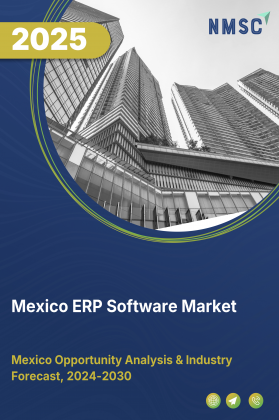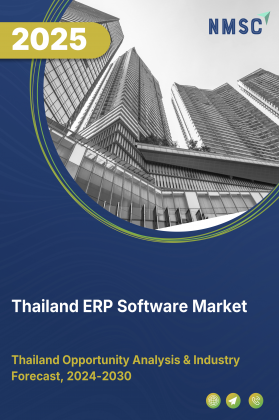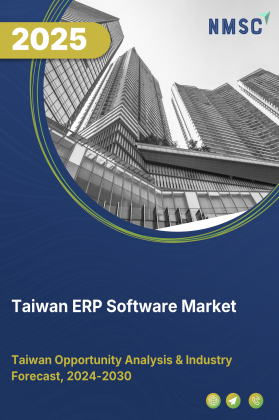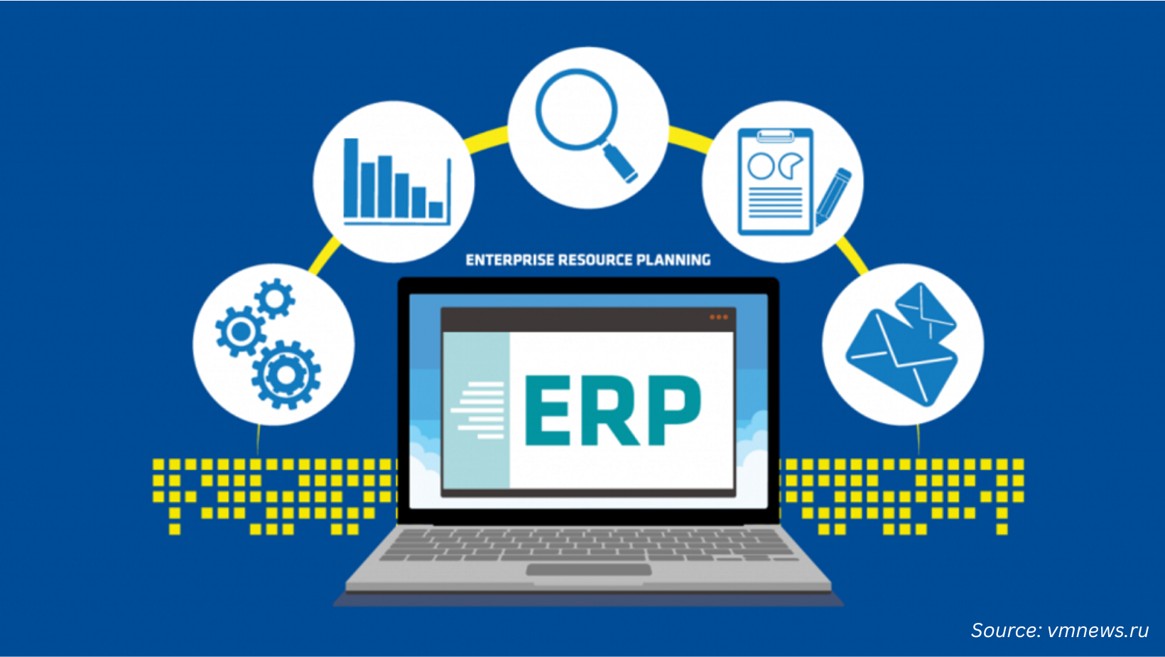
Mexico ERP Software Market by Component (Software, and Services), Deployment (On-Premise, Cloud, and Hybrid), Business Function (Enterprise Asset Management, Financial Management, Human Capital Management, and Others), Application (Manufacturing, BFSI, Healthcare, Retail & Distribution, Government, IT & Telecom, and Others), and End Users (Small & Medium Enterprises, and Large Enterprises) – Trends and Forecast, 2025–2030.
Industry: ICT & Media | Publish Date: 17-Oct-2025 | No of Pages: N/A | No. of Tables: N/A | No. of Figures: N/A | Format: PDF | Report Code : IC3603
Industry Outlook
The Mexico ERP Software Market size was valued at USD 3.54 billion in 2024 and is projected to grow to USD 3.96 billion by 2025. Additionally, the industry is expected to continue its growth trajectory, reaching USD 5.14 billion by 2030, with a CAGR of 5.34% from 2025 to 2030.
The Mexico ERP software market is expanding rapidly, driven by digital transformation in the healthcare sector and a booming e-commerce landscape that demands streamlined operations and data integration. The rise of Electronic Health Records (EHRs) and stronger pharmaceutical supply chains is prompting ERP adoption for compliance and efficiency. Meanwhile, social commerce growth is pushing retailers to adopt scalable, automated ERP systems. However, the market faces restraints due to a shortage of skilled IT professionals and cultural resistance to technology adoption. Looking ahead, IoT integration with ERP platforms presents significant opportunities by enhancing real-time monitoring, predictive maintenance, and operational efficiency in key sectors.
Healthcare Sector Fuels the Mexico ERP Software Market Expansion
Mexico’s healthcare sector is undergoing digital transformation, driving ERP adoption across hospitals and pharmaceutical companies. The growing use of Electronic Health Records (EHRs) requires integrated systems to manage patient data, ensure regulatory compliance, and streamline internal operations. According to Healthpoint, Mexico’s EHR market was valued at USD 1.26 billion in 2023 and is projected to reach USD 1.66 billion by 2030, growing at a CAGR of 4%. In addition, bilateral efforts to strengthen pharmaceutical supply chains between the U.S. and Mexico are increasing the need for ERP systems that provide traceability, quality control, and alignment with evolving health regulations.
E-Commerce Boom Accelerating ERP Market Growth
Mexico’s rapid e-commerce growth is significantly boosting demand for ERP software market. In 2023, retail sales generated through social media platforms in Mexico surged by over 20%, surpassing $2 billion. Projections suggest that by 2025, social commerce will represent 40% of all online sales in the country, with the gross transaction value expected to exceed $6 billion by 2028. As online retail expands, businesses are adopting ERP systems to manage complex backend operations such as inventory, fulfilment, and customer engagement. These systems provide the scalability, automation, and data-driven insights needed to support high-volume, multi-channel commerce, making ERP adoption a critical factor in sustaining growth in Mexico’s digital economy.
Lack of Skilled Workforce Hinders ERP Adoption
A major restraint in Mexico’s ERP market is the shortage of skilled IT professionals capable of implementing and maintaining complex ERP systems. Additionally, many traditional businesses show resistance to adopting new technologies, favouring manual processes or fragmented systems. This cultural reluctance, coupled with limited technical expertise, slows ERP deployment and limits the benefits that digital integration offer, especially in sectors like manufacturing and distribution, where legacy operations are deeply embedded.
IoT Integration Elevates ERP Systems, Driving Efficiency and Market Expansion
The integration of Internet of Things (IoT) technology with ERP systems is rapidly becoming a major driver of growth, providing real-time data visibility and enhanced operational control. IoT-enabled ERP platforms allow businesses to track inventory, monitor equipment performance, and predict maintenance needs, significantly improving efficiency in sectors like manufacturing and logistics. In March 2025, Epicor Software Corporation introduced Epicor Kinetic 2025, a next-generation ERP solution featuring advanced IoT integration for real-time monitoring and predictive maintenance in manufacturing environments. This innovation demonstrates the transformative impact of IoT on ERP functionality and highlights the increasing demand for smart, connected enterprise solutions.
Competitive Landscape
The market players operating in the Mexico ERP software industry include SAP SE, Microsoft Corporation, Oracle NetSuite, ERP Group Mexico, Workday, Inc., Acumatica, Epicor Software Corporation, GM3s Software, Odoo, Advanta Information Systems SA de CV, Castelec, Infor, ExpertEasy ERP, Intelisis Software, Rockwell Automation. and others.
Mexico ERP Software Market Key Segments
By Component
-
Software
-
Service
By Deployment
-
On Premise
-
Cloud
-
Hybrid
By Business Function
-
Enterprise Asset Management (EAM)
-
Record Assets (Asset Mgmt)
-
Analytics & BI
-
Disposal of Assets
-
Others
-
-
Financial Management System
-
Core Financials
-
Corporate Performance Mgmt (CPM)
-
Financial Consolidation
-
Others
-
-
Human Capital Management (HCM)
-
Talent Management
-
Administrative HR
-
Workforce Management
-
Others
-
-
Manufacturing and Operations
-
Production Planning and Scheduling Products
-
Production Ops and Control Products
-
Manufacturing Information Mgmt Products
-
Others
-
-
Supply Chain Management (SCM)
-
Inventory management
-
Warehouse management
-
Transportation management
-
Procurement
-
Contract Management
-
-
Others
By Application
-
Manufacturing
-
BFSI
-
Healthcare
-
Retail & Distribution
-
Government
-
IT & Telecom
-
Construction
-
Aerospace Defense
-
Other Industries
By End Users
-
Small and Medium-Sized Enterprise
-
Large Enterprise
Key Players
-
Microsoft Corporation
-
Oracle NetSuite
-
ERP GROUP MEXICO
-
Acumatica
-
Epicor Software Corporation
-
GM3s Software
-
Odoo
-
Advanta Information Systems SA de CV
-
Castelec
-
Infor
-
ExpertEasy ERP
-
Intelisis Software
-
Rockwell Automation
Report Scope and Segmentation
|
Parameters |
Details |
|
Market Size in 2025 |
USD 3.96 Billion |
|
Revenue Forecast in 2030 |
USD 5.14 Billion |
|
Growth Rate |
CAGR of 5.34% from 2025 to 2030 |
|
Analysis Period |
2024–2030 |
|
Base Year Considered |
2024 |
|
Forecast Period |
2025–2030 |
|
Market Size Estimation |
Billion (USD) |
|
Growth Factors |
|
|
Companies Profiled |
15 |
|
Market Share |
Available for 10 companies |
|
Customization Scope |
Free customization (equivalent up to 80 working hours of analysts) after purchase. Addition or alteration to country, regional, and segment scope. |
|
Pricing and Purchase Options |
Avail customized purchase options to meet your exact research needs. |

















 Speak to Our Analyst
Speak to Our Analyst

























